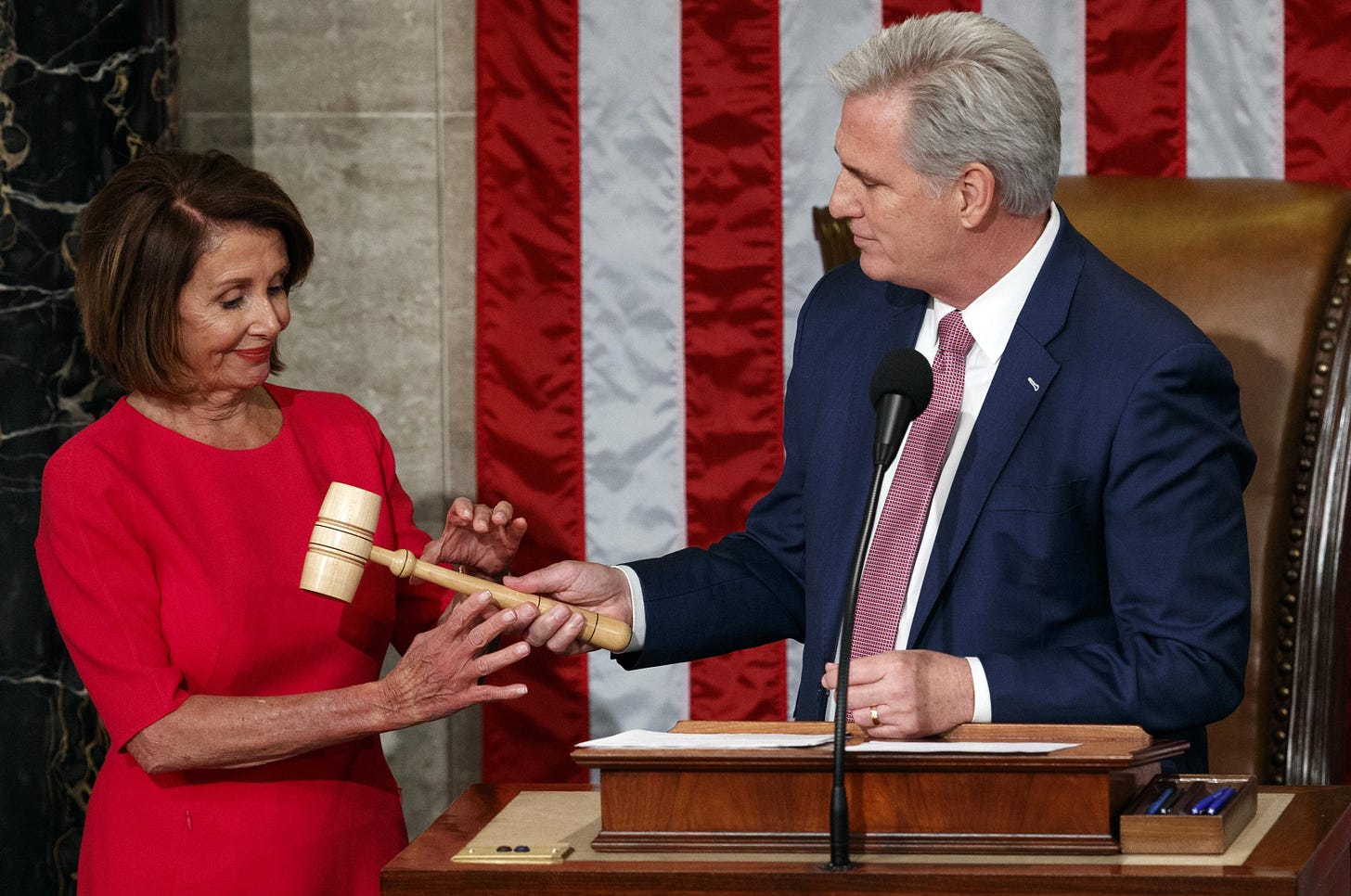House GOP and Conservatives, Pick A Different Fight
The potentially disastrous sideshow over opposition to US Rep. Kevin McCarthy's House Speaker bid feeds media's silly, conspiratorial caricatures of Republicans.
If Kevin McCarthy is looking for musical inspiration in his battle to become Speaker of the House on January 3rd, he might turn to fellow Bakersfield native, the late Merle Haggard.
The country music icon and son of Depression-era dust bowl immigrants from Oklahoma was born near McCarthy’s hometown, a farming and food production mecca at the southern end of California’s fertile San Joaquin Valley. Along with fellow legend Buck Owens, they launched the Bakersfield music scene. In 1973, his song “If We Make It Through December” rose to number six on the country music charts.
If McCarthy can make it through his caucus’s antics in December, he should be able to avoid singing Haggard’s “Are the Good Times Really Over? (1982)” come January 3rd. In the meantime, he and the House Freedom Caucus will “Chase Each Other Around the Room (1984).”
It is well known that US Rep. Kevin McCarthy (R-CA) needs 218 votes - a majority of those present and voting - to capture the gavel. As of this writing, his caucus sits at 221 members, with a decent chance to secure one more in a California House seat that, believe it or not, is still counting ballots.
Problem, you might ask? After all, shouldn’t all the members of McCarthy’s caucus support his election? What’s their alternative? The other nominee will be Democrat US Rep. Hakeem Jeffries (D-NY), following Nancy Pelosi (D-CA) stepping down from her interminable reign as the House Democrats’ undisputed if not highly effective sovereign.

But several of the 31 House Republicans who voted for McCarthy’s challenger in the post-election caucus, US Rep. Andy Biggs (R-AZ), seem determined to continue their opposition to McCarthy to a floor vote on Day One of the 118th Congress. The Washington Examiner tells the tale.
House Minority Leader Kevin McCarthy's (R-CA) bid to clinch the speaker's gavel is at risk of falling apart due to insufficient support from his conference.
McCarthy launched his effort to be House speaker earlier this month in a closed-ballot vote by his conference. At the time, he only earned 188 of the 218 votes necessary to become speaker, with 31 votes going to his surprise challenger: House Freedom Caucus Chairman Andy Biggs (R-AZ). Biggs is one of the dozens of Republicans who have refused to support McCarthy's speakership bid. That opposition, combined with a less-than-stellar turnout by Republicans in the 2022 midterm elections, is jeopardizing McCarthy's chances of securing the gavel.
"I cannot vote for Kevin McCarthy as House Speaker," Biggs tweeted earlier this month after launching his bid for the gavel. "I do not believe he will ever get to 218 votes, and I refuse to assist him in his effort to get those votes."
Other Republicans who oppose McCarthy include Reps. Ralph Norman (R-SC), Matt Gaetz (R-FL), and Bob Good (R-VA). Norman argued Tuesday that McCarthy lost any chance to gain his favor when he rejected the Republican Study Committee’s seven-year plan for balancing the budget. The RSC is a highly influential group that makes up more than half of the GOP conference.
Some Republicans have been vocal about their support for McCarthy in his bid for House speaker, including Reps. Marjorie Taylor Greene (R-GA) and Jim Jordan (R-OH).
While the Senate functioned without floor leaders until 1913, the House has always had a Speaker. Except when it didn’t during a brief, tumultuous time when the two-major-party system broke down in 1856. The House finally agreed to elect a Speaker by a plurality - first past the post.
These recalcitrant renegades, most of whom belong to the House Freedom Caucus, could force multiple floor votes for Speaker, which last happened in 1923. It is a political game of chicken - if they can’t implement their agenda, which apparently includes hanging over a McCarthy speakership like a Damocles Sword, they hope to use the 30 or so votes in a new Congress to leverage a different Speaker.
They’ve done it before. When they failed to support then-Speaker John Boehner’s budget negotiations with the Obama Administration, leading him to resign in 2015, the Freedom Caucus refused to support his apparent successor - McCarthy. He stepped away from the race to succeed Boehner, leading them to settle on House Ways and Means Chair and 2012 vice presidential candidate Paul Ryan (R-WI). Ryan served until retiring in 2018 when Democrats swept back into power behind Nancy Pelosi. McCarthy has been serving as GOP Minority Leader ever since.
The Freedom Caucus has dusted off its 2015 playbook. This time, however, McCarthy has had four years to demonstrate his conservative bonafides. Here they are:
McCarthy engineered the House GOP’s Commitment to America, a well-balanced plan that outlines an agenda with a roadmap he is already implementing (too bad that too few House candidates ran on it during their campaigns).
Just this week, he visited the disastrous southern border, where he called on Homeland Security Secretary Anthony Mayorkis to resign.
Income House GOP chairs have put 42 Biden Administration officials on notice as part of their oversight and investigations outline.
And he’s turning the tables on Democrats to force three of their controversial members off key committees: the outgoing Intelligence Committee’s deeply partisan and truth-challenged chair, Adam Schiff, and Chinese spy compromised fellow committee member Eric Swalwell (both of California), along with the anti-semitic Ilhan Omar, a member of the House Foreign Affairs Committee.
Enough Members have at least mouthed opposition to McCarthy’s ascension that unless something - or someone - gives, the first week of January may turn the House into “A Place to Fall Apart (1985).” Aside from the aforementioned House members, Montana’s Matt Rosendale and Texas’ Chip Roy have expressed reservations and doubts. That leaves McCarthy with no margin. Back-channel chats are no doubt being held. Forbes’ Sara Dorn outlines what’s likely to occur in the next few weeks:
Already, (McCarthy) has agreed to some rules changes, including appointing more regional representatives to the steering committee, which dilutes the voting power of committee leaders. The Freedom Caucus also wants to allow any member to initiate proceedings to remove the speaker via a “motion to vacate.” The conference shot down that rule in a meeting on November 16, but nothing is finalized until the next Congress takes over in January, and Republicans are expected to discuss additional rules changes after Congress returns from Thanksgiving recess.
Gaetz, Biggs, Norman, Good, Roy, and Rosenthal are getting plenty of support from Always Trump, “American First” populist media and activists who use terms like “uniparty” and “drain the swamp.” This 2016 post from conservativetreehouse.com explains it well:
Within the UniParty there are factions, each with their own flag. One flag represented by a Donkey, the other represented by an elephant. Life inside the DC caFhere’s not much difference between the two factions when they are inside the castle, and any visitor will attest to an impossibility in determining who’s on whose side. However, when they travel outside the castle they must keep up appearances, and seem entirely divergent from each other.
They wear different colors when outside the walls, to make sure there’s an entirely distinct optic presented for those who don’t live in the castle. It’s a rather unusual game to follow.
From time to time the colors flying at the top of the castle changes. A few seasons of a blue-flagged donkey, a few seasons of a red-flagged elephant – each taking time serving as the pinnacle flag.
However, the behavior inside does not change much. Other than a few executive suites necessarily shifting depending on the flag, not much changes. It’s the same opulent dinner served every night in the grand dining hall regardless of who’s flag sits atop the spire. All those who live within the castle live a very comfortable life.
This is not a perspective held by just conservatives. A good number on the progressive left - perhaps more - feel the same way, despite radically different political and policy agendas. Each party struggles with its noisy, impatient, and restless bases, who have grown increasingly angry with the “establishment elite” in Washington, DC.
The reality is that a large and growing middle group rejects the antics of both wings and is looking for practical, common-sense leaders who look a lot like several GOP governors (and, frankly, a few Democrats). These independents and persuadable centrist Democrats and Republicans are looking for “adults in the room.” They comprise a larger share of the electorate - 31 percent in 2022 - than either self-identified Democrats or Republicans. They voted to stick with the status quo earlier this month and asked both parties, “I Wonder If They Ever Think of Me? (1973)”
I admire most members of the House Freedom Caucus, many of whom I have met. They are patriots, genuinely motivated and inspired by the sacrifices and contributions of our founders and generations since, with an unyielding commitment to the spirit and the letter of the Constitution. The same is true of their vocal and committed supporters. But a “My Way or the Highway” (Reliant K, 2001) approach isn’t very persuasive to millions of Americans whose votes the Freedom Caucus needs to move the country in their general direction.
They should think twice before taking “A Tiger by the Tail (Owens, 1965).” It won’t end well.
There are plenty of battles ahead in the most narrowly divided Congress in history and a contentious presidential election around the corner. Creating chaos around the selection of a Speaker supported by 80 percent of the Republican Conference is not the one they should begin with.
On Tuesday, January 3rd, this “Okie From Muskogee (1969)” suggests that they should join hands, elect Speaker McCarthy, and sing “It’s Been a Great Afternoon (1978).” Otherwise, they’ll end up “Going Where the Lonely Go (1983).”






Most informative piece I’ve read on this issue. Enjoyed the Merle and Buck references, I’m a big fan of Merle, thanks